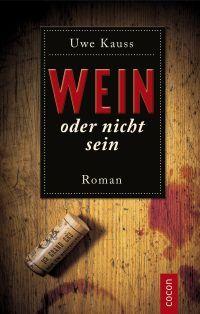Three friends - a wine collector, a wine critic and a wine merchant - are locked up in the old air-raid shelter in which the first-named stores several thousand bottles and which is located on the property of his remote house. For the three of them it looks like a coincidence, but in reality a former colleague of the collector has his fingers in the pie. The three wine lovers are trapped with the best and most expensive wines in the world and have to hold out for at least a week before there is a chance that they will be freed - by the cleaning lady who can turn off the alarm system and thus cancel the electronic security of the bunker door. There is no mobile phone reception behind reinforced concrete walls underground and no possibility of communication with the outside, and all attempts to free the trapped people fail.
So the three main characters in the bunker have plenty of time - to think, to talk and also to taste and drink. A basic supply of food and sanitary facilities is fortunately secured for the time being, and the conversations of the three revolve around, among other things, the motives for collecting wine, the meaning and value of wine reviews and, of course, wine itself: Origins, vintages, personal memories.
 |
| Red wine or blood? A cursory glance at the book title allows various associations... (Image: Cocon Publishing House) |
The number of characters in the book is manageable overall, and author Uwe Kauss establishes a certain closeness to the three protagonists insofar as he only calls them by their first names after the one-off introduction. He keeps a little more narrative distance from their "jailer", whose motives only gradually become clear (and it takes almost 200 pages before it is clear whether they are actually justified). In the end, however, even he appears as the actual main character of the book. Kauss designs two parallel storylines that cross each other several times in the course of the story: on the one hand, the three prisoners in the wine cellar and, on the other hand, the one who holds them and his family. The book is structured by days - from the first day in the "wine prison" to the last (we will not reveal how many there are here).
In the course of the almost 300 pages of text, Kauss delves deeper and deeper into the psychology of his protagonists; the reader learns more and more about the common prehistory and also about the past of the individual characters, until - as befits a good novel - the surprising resolution. The resolution, by the way, brings to light yet another dimension of the professional preoccupation with wine, in addition to the collecting, judging and acting. With increasing drama, the events in the cellar turn into a chamber play along the lines of Francis Durbridge, and finally existential questions are at stake. So the title "Wine or not to be", which at first may seem a bit pretentious and theatrical, is truly well-chosen; in how many ways it applies is only revealed after reading.
"An intelligently woven, captivatingly narrated novel about obsession and wine, guilt and debt, men and friendship, and the subtle difference in our society," the book cover promises. This announcement is to be agreed with unreservedly. "Wine or Not to Be" is an entertaining, knowledgeable and pointedly written wine thriller about a crime that may not be a crime at all and whose evaluation is left to the reader at the end. The characters are sharply drawn, and anyone who is active in the wine industry will recognise characters in the portrayals that he or she encounters many times in the real wine world. In this respect, Uwe Kauss takes a tongue-in-cheek but also cautionary look at the wine scene.
 |
| As a journalist, author Uwe Kauss is used to% getting to the bottom of things. He lives near Frankfurt am Main. (Photo: U. Kauss) |
The author himself does not see his book as a crime novel at all. "I have written a novel, an exciting story, but not a thriller in the classical sense with the clear distinction between good and evil," he says. Although it is ultimately about the topic of justice, firstly it is not completely resolved, and secondly it is more about the people, their relationship to each other and also their relationship to the wine. Kauss describes the ending as an "ironic happy ending", and the fact that it remains open how the characters will deal with what they have experienced is intentional.
Six years passed from the first idea for the book to its publication. During these six years, Kauss recounts, he drafted several versions of the plot and changed them again and again, but the course of events was always planned through to the end. "I think it's a rumour that a writer sits down - possibly with a glass of wine - and then the story just flows into his pen or keyboard today, that the plot only emerges during the writing process, so to speak," Kauss clarifies. "The book was hard work."
But how did he come up with the topic? "The idea came about during a tasting of top-class wines in a renowned restaurant in Austria. There is a large bottle cellar there, part of which is in an old nuclear bunker. I once stood in this bunker all by myself for a few minutes, and it was a strange feeling: the concrete stairs, the brick corridors, the airlock, the heavy steel door...". At the time, he thought to himself, "This is a place for a plot!"
At first it was vague and undirected - "a captivating thought, but unreflective". He then thought about how people who only talk about wine every day would behave if they only had themselves and the wine, "without the representation in society", reports Kauss. Wine, he says, is an instrument through which people position themselves in bourgeois society, a symbol of wealth and status, a myth. "Wine represents something, and something is represented with it. I wanted to deconstruct this myth of wine and explore the question of what happens when you take people out of the world and lock them up so that they are only thrown back on themselves and the others. How does their relationship to wine change under these circumstances?" Kauss cites Ingmar Bergman as a role model for this approach.
 |
| You can also get to know the book and the author at readings - preferably at a winery. (Photo: U. Kauss) |
At first, he "tinkered around in a notebook page by page". In the course of time, the characters took on more and more shape, and by now he knew them inside out. They are complete personalities, each with an individual history that is reflected in the plot of the book: the wine critic, for whom wine is a stage; the wine merchant, for whom wine means money and status; and the wine collector, who only knows the world through wine. And finally, the collector's former work colleague who, for the first time in his life, goes his own way, makes a decision and has to implement it. They are all fictional, but true to life and taken from everyday life. "You could know these people even if they have no real-life connection," says Kauss.
It is important to him that there are two levels in his novel: one below ground, where everything revolves around wine, and the other above ground, which has nothing to do with wine. In a way, this also reflects a tension in society. The book is Kauss' first work of this kind: "For 25 years I've made a living from writing, and for the first time I didn't think about target groups, I just wrote my own story." He found a publisher at Cocon-Verlag in Hanau, where Kauss was known as a non-fiction author and was very taken with his first work of fiction.
The book title shows a cork and red wine stains on a wooden plate, presumably on a table (as it also plays a role in the story). Kauss reveals that this accessory was from a 1988 Château Haut-Brion, which he had drunk himself. In general: How did he get the sensory impressions of the numerous valuable and rare wines described in the book? "Well, some wines I actually tasted myself," smiles Kauss, "but for the others I was helped by the extensive tasting notes of a wine collector I'm friends with."
"Wine or Not to Be" is a novel that takes you deep into the world of wine without overwhelming laymen. For this, not least - at the publisher's suggestion - there is a glossary at the end of the book that explains important terms and also the many exquisite wines. "Can do" is a favourite saying of the wine collector in the story. In a variation of this, however, "can be read" would be too weak a comment for the book: in fact, it should be read - to be well entertained and to learn a lot about wine and people at the same time.